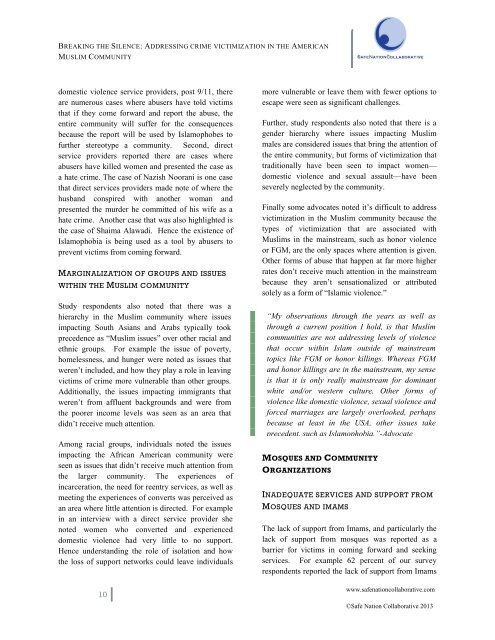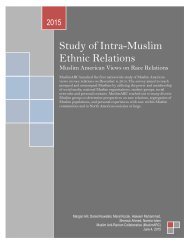Breaking-the-Silence
Breaking-the-Silence
Breaking-the-Silence
Create successful ePaper yourself
Turn your PDF publications into a flip-book with our unique Google optimized e-Paper software.
BREAKING THE SILENCE: ADDRESSING CRIME VICTIMIZATION IN THE AMERICAN<br />
MUSLIM COMMUNITY<br />
domestic violence service providers, post 9/11, <strong>the</strong>re<br />
are numerous cases where abusers have told victims<br />
that if <strong>the</strong>y come forward and report <strong>the</strong> abuse, <strong>the</strong><br />
entire community will suffer for <strong>the</strong> consequences<br />
because <strong>the</strong> report will be used by Islamophobes to<br />
fur<strong>the</strong>r stereotype a community. Second, direct<br />
service providers reported <strong>the</strong>re are cases where<br />
abusers have killed women and presented <strong>the</strong> case as<br />
a hate crime. The case of Nazish Noorani is one case<br />
that direct services providers made note of where <strong>the</strong><br />
husband conspired with ano<strong>the</strong>r woman and<br />
presented <strong>the</strong> murder he committed of his wife as a<br />
hate crime. Ano<strong>the</strong>r case that was also highlighted is<br />
<strong>the</strong> case of Shaima Alawadi. Hence <strong>the</strong> existence of<br />
Islamophobia is being used as a tool by abusers to<br />
prevent victims from coming forward.<br />
MARGINALIZATION OF GROUPS AND ISSUES<br />
WITHIN THE MUSLIM COMMUNITY<br />
Study respondents also noted that <strong>the</strong>re was a<br />
hierarchy in <strong>the</strong> Muslim community where issues<br />
impacting South Asians and Arabs typically took<br />
precedence as “Muslim issues” over o<strong>the</strong>r racial and<br />
ethnic groups. For example <strong>the</strong> issue of poverty,<br />
homelessness, and hunger were noted as issues that<br />
weren’t included, and how <strong>the</strong>y play a role in leaving<br />
victims of crime more vulnerable than o<strong>the</strong>r groups.<br />
Additionally, <strong>the</strong> issues impacting immigrants that<br />
weren’t from affluent backgrounds and were from<br />
<strong>the</strong> poorer income levels was seen as an area that<br />
didn’t receive much attention.<br />
Among racial groups, individuals noted <strong>the</strong> issues<br />
impacting <strong>the</strong> African American community were<br />
seen as issues that didn’t receive much attention from<br />
<strong>the</strong> larger community. The experiences of<br />
incarceration, <strong>the</strong> need for reentry services, as well as<br />
meeting <strong>the</strong> experiences of converts was perceived as<br />
an area where little attention is directed. For example<br />
in an interview with a direct service provider she<br />
noted women who converted and experienced<br />
domestic violence had very little to no support.<br />
Hence understanding <strong>the</strong> role of isolation and how<br />
<strong>the</strong> loss of support networks could leave individuals<br />
10<br />
more vulnerable or leave <strong>the</strong>m with fewer options to<br />
escape were seen as significant challenges.<br />
Fur<strong>the</strong>r, study respondents also noted that <strong>the</strong>re is a<br />
gender hierarchy where issues impacting Muslim<br />
males are considered issues that bring <strong>the</strong> attention of<br />
<strong>the</strong> entire community, but forms of victimization that<br />
traditionally have been seen to impact women—<br />
domestic violence and sexual assault—have been<br />
severely neglected by <strong>the</strong> community.<br />
Finally some advocates noted it’s difficult to address<br />
victimization in <strong>the</strong> Muslim community because <strong>the</strong><br />
types of victimization that are associated with<br />
Muslims in <strong>the</strong> mainstream, such as honor violence<br />
or FGM, are <strong>the</strong> only spaces where attention is given.<br />
O<strong>the</strong>r forms of abuse that happen at far more higher<br />
rates don’t receive much attention in <strong>the</strong> mainstream<br />
because <strong>the</strong>y aren’t sensationalized or attributed<br />
solely as a form of “Islamic violence.”<br />
“My observations through <strong>the</strong> years as well as<br />
through a current position I hold, is that Muslim<br />
communities are not addressing levels of violence<br />
that occur within Islam outside of mainstream<br />
topics like FGM or honor killings. Whereas FGM<br />
and honor killings are in <strong>the</strong> mainstream, my sense<br />
is that it is only really mainstream for dominant<br />
white and/or western culture. O<strong>the</strong>r forms of<br />
violence like domestic violence, sexual violence and<br />
forced marriages are largely overlooked, perhaps<br />
because at least in <strong>the</strong> USA, o<strong>the</strong>r issues take<br />
precedent, such as Islamophobia.”-Advocate<br />
MOSQUES AND COMMUNITY<br />
ORGANIZATIONS<br />
INADEQUATE SERVICES AND SUPPORT FROM<br />
MOSQUES AND IMAMS<br />
The lack of support from Imams, and particularly <strong>the</strong><br />
lack of support from mosques was reported as a<br />
barrier for victims in coming forward and seeking<br />
services. For example 62 percent of our survey<br />
respondents reported <strong>the</strong> lack of support from Imams<br />
www.safenationcollaborative.com<br />
©Safe Nation Collaborative 2013



